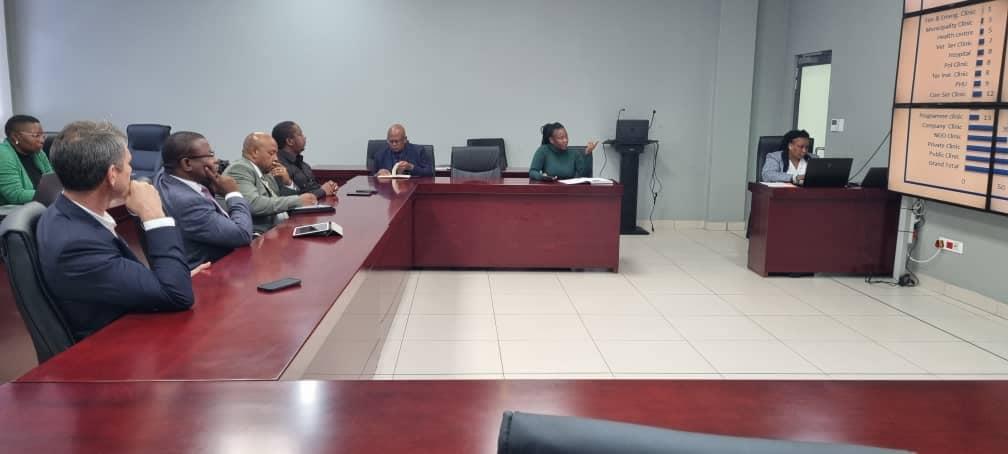Africa-Press – Eswatini. Chairperson of the Cabinet Sub-Committee on the health crisis, Minister Manqoba Khumalo, has assured the public of ongoing efforts to ensure essential medicinal drugs’ accessibility by the end of January 2024.
Khumalo emphasised government’s steadfast commitment to addressing the persistent challenge of medicinal drugs availability within the country, highlighting substantial progress in remedying concerns regarding the Central Medical Stores (CMS).
“Delivery vehicles are currently at 80 per cent completion for the installation of essential tracking devices and cameras, which is a pivotal step in ensuring the secure and monitored transportation of medical supplies,” stated Khumalo following the committee’s meeting at the Mbabane Government Hospital New Wing yesterday.
Acknowledging the obstacles faced by suppliers, Khumalo stressed that delayed government payments have significantly impacted vital services, including oxygen suppliers, cleaning, security and catering.
“Resolving outstanding invoices is crucial to facilitating the flow of essential medicines into the healthcare system,” he said.
“We will implement stringent monitoring mechanisms upon the arrival of drugs, utilising vehicles equipped with tracking devices and camera systems,” he added, stating that this would ensure comprehensive management reports, preventing any instances of drug disappearance.
Khumalo also expressed gratitude for the minister of finance’s assurance regarding budget availability to settle outstanding invoices, crediting this step for streamlining the procurement process and facilitating an uninterrupted supply of crucial drugs.
Last week, the committee toured the Central Medical Stores (CMS) to gain insight into the cause of the shortage, which has escalated into a crisis in the country’s health system.
During the tour, the committee was informed that the procurement process was the major cause of the drugs shortage in public health facilities.
The CMS procurement team informed the committee that the procurement process was tedious, involving a lot of manual paperwork that needed to be signed by various departments before payments could be made.
They highlighted that errors or missing documents necessitated restarting the process from scratch, slowing down the entire process and leading to delays.The CMS procurement team, led by Thembi Gama, informed the subcommittee that 12 suppliers were owed over E33.3 million for the current financial year by government.
The team highlighted that the outstanding debt has led to these suppliers not delivering any pharmaceuticals and medicinal supplies to the CMS.
The suppliers explained that they were in debt because of the money owed by the government, as they take loans when buying the stock.
The subcommittee, chaired by Minister Manqoba Khumalo, comprises Minister of Health Mduduzi Matsebula, Minister of Labour and Social Security Phila Buthelezi, and Health Principal Secretary (PS) Khanya Mabuza.During the tour, the subcommittee probed the CMS team on systems to monitor drugs dispatched form the CMS to various health facilities on time.
Minister Buthelezi noted that some drugs were stolen from government, and therefore, recommended surveillance of all vehicles that transport medication and medical supplies from the CMS to various health facilities.
Minister Khumalo also echoed Buthelezi’s point about supplies not reaching their intended destinations, and instead, being diverted to unknown end-points.In response, the team said all dispatched supplies were recorded and checked before being transported to the various facilities all over the country.
“When they reach these centres, the supplies are checked and someone signs off confirming receipt,” explained Gama, something the committee was not impressed with, on reason that the receiving personnel could confirm receipt without actually receiving them.
The CMS team noted that cameras and tracking systems were available, but were not operative due to licensing issues.
Renowned Nigerian pharmaceutical innovation expert Abimbola Adekin has recommended the introduction of artificial intelligence (AI) into the requisition, acquisition, and distribution process of medicines to public health facilities.
Adekin, the Chief Executive Officer of Advantage Health Africa, a healthcare solution company providing technology products and services to promote access to affordable, quality healthcare across the African continent, believes that the science of making machines think like humans could eliminate drug stock-outs and manage supply chain processes, curbing corruption.
“Procurement constraints in medicinal drugs are not purely an issue affecting Eswatini, but many countries across the continent, since less than five per cent of the drugs consumed by Africans are produced in Africa,” she said.
She explained that the introduction of an AI-driven medical procurement platform removes brokers and middlemen from the value chain, thereby generating cost savings of up to 40 per cent for the country, easing supply chain issues.
For More News And Analysis About Eswatini Follow Africa-Press







